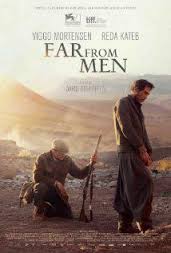
FAR FROM MEN/ LOINS DES HOMMES
France, 2014, 97 minutes, Colour.
Viggo Mortensen, Reda Kateb.
Directed by David Oelhoffen.
Circumstances.
Choices.
Cowardice and honour.
Camus.
It is 1954 in Algeria, and Camus country. The French have colonised Algeria. The French Legion has kept order. Now is the time for the rebels to rise and fight for independence – something, which at this stage of the action in this film, is still some time to come. This film is based on a short story by Albert Camus.
Algeria, and its interiors, may well seem far from men. At the opening, Daru (Viggo Mortensen) is teaching a small group of children on a plateau in the Atlas Mountains,.playing, teaching them to read. He is something of a mysterious character, especially when a man accused of killing his cousin is entrusted to his care. Then the tone of the film changes, the teacher leaving a note on his board that there will be no classes that day.
The accused man, Mohammed (Reda Kateb), asks to be taken to a nearby town. Instead, Daru ousts him, accusing him of lack of honour and of cowardice. Daru himself is a man of honour, and decides that he will accompany his prisoner, packing bags and provisions to walk for a day through the desert. The man’s relatives have attacked the school, with their revenge code, and, to avoid them, the two men have to scale the mountains. It is a difficult, if spectacular, trek, a rider confronting them with a shootout and burial, Mohammed, devoutly Muslim, praying for the dead man.
Eventually, they come across a group of rebels and Daru’s back story is provided, son of Spanish settlers, growing up in Algeria, serving in the military, earning loyalties from his men, but now, on opposite sides, enmities will assert themselves. The French also catch up with the rebels, releasing the hostages but firing indiscriminately on men who think they are surrendering. Daru, the man of honour, rebukes the French for this violence.
The story is one of growing respect between the two men, of incipient friendship, of arriving in the town, of Mohammed having his first sexual experience, and his having to make a decision whether he will go into the desert into anonymity or go to give himself up to the police. Daru also has to make a decision whether to return to the school or to become more active in the emerging civil war.
The two leads give strong performances and it is admirable to see Viggo Mortensen in so many international productions, with his command of many languages, here French and also speaking some Arabic.
SIGNIS (World Catholic Association for Communication) award winner at the 2014 Venice Film Festival.
1. A short story by Albert Camus? Algeria? The 1950s?
2. 1954, French occupation of Algeria, the Foreign Legion, the rebellion of the Arabs? The war for Independence?
3. The Arabs, Spanish settlers in Algeria, the French settlers, the history?
4. Location photography, the plateau, the mountains, the desert, the roads, the school and isolation, the huts, the towns? The? The musical score?
5. Daru, at the school, playing with the kids, teaching, teaching them to read? The gradual revelation of his story? Spanish origins of his family? his parents, settlers, harvests? Growing up in the Algerian town? His military service, the rank of major, the many contacts, respect from the men? His decision to teach? His motivation?
6. Mohammed, delivered to Daru? His character, silent, the death of his cousin, the issue of the crops, the family starving, killing, revenge within the family? A man to be saved?
7. Daru desperate, wanting to oust Mohammed, his anger, Mohammed’s requests to take him to the town? The cousins’ arrival, the shooting, the death of
the horse?
8. Daru and his saying Mohammed had no honour, was a coward?
9. His change of heart, packing for the journey, the guns, walking, the riders through the desert, hiding, going over the mountains, slipping down the side? The lone rider, the confrontation, the rider being shot, buried, Mohammed praying for him?
10. The huts, drenched in the rain, no roofing for the hut, preparing the fire?
11. The arrival of the rebels, the friendship with Daru? On opposite sides? Memories of the past, yet loyalties and enmities?
12. The French soldiers, the rebels claiming Daru as a hostage, fighting, the rebels surrendering, their being shot? The leader and his escape? Daru protecting Mohammed?
13. The French, checking Daru’s story? The severity of his reprimand of the officers for shooting the unarmed men? The rationale for shooting them?
14. Going to the town, the manager of the bar, past memories of the family, Mohammed and the discussion about his dying without ever knowing a woman? Daru and his organising it? The young prostitute? Offering herself to the Daru, his comments about the long time?
15. His taking Mohammed, the bond between them, the gift of the Arab coin?
16. The crossroads, either to go to the desert and survive, or go to the town and give himself up to the police? Mohammed’s choice?
17. Daru, returning to teach, the joy of the children, learning to read, the last day of class, Daru and his leaving – and what future?